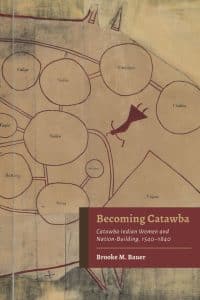NOTE: THIS WEBSITE IS A WORK IN PROGRESS. RESOURCES AND DATA ARE ADDED DAILY.
IMPORTANT: We are in urgent need of funding to keep this project alive and ensure its future. If you’re enjoying the site and see our vision for the project, please consider contributing to the Melungeon Roots crowdfunding campaign today. It is only with your help that we can continue this work. MORE INFO / DONATE
Thanks so much for your support! – Jes
![]()
Becoming Catawba: Catawba Indian Women and Nation-Building, 1540-1840
share:
Some buttons on this page link to external websites. If you visit one of our affiliate sites and make a purchase, I may receive a small commission at no extra cost to you. More info
- UPDATED: 6.29.2025
- Indigenous history, women
author:
Brooke M. Bauer
editor:
n/a
publisher:
date:
8.15.2024
ISBN:
9780817361907
pages:
264
notes:
contents:
description:
This unique and important study examines the lives and legacies of women who executed complex decision-making and diplomacy to navigate shifting frameworks of kinship, land ownership, and cultural production in dealings with colonial encroachments, white settlers, and Euro-American legal systems and governments from the mid-sixteenth century to the early nineteenth century. Personified in the figure of Sally New River, a Catawba cultural leader to whom 500 remaining acres of occupied tribal lands were deeded on behalf of the community in 1796 and which she managed until her death in 1821, Bauer reveals how women worked to ensure the survival of the Catawba people and their Catawba identity, an effort that resulted in a unified nation.
Bauer's approach is primarily ethnohistorical, although it draws on a number of interdisciplinary strategies. In particular, Bauer uses "upstreaming," a critical strategy that moves toward the period under study by using present-day community members' connections to historical knowledge--for example, family histories and oral traditions--to interpret primary-source data. Additionally, Bauer employs archaeological data and material culture as a means of performing feminist recuperation, filling the gaps and silences left by the records, newspapers, and historical accounts as primarily written by and for white men. Ultimately, Becoming Catawba effects a welcome intervention at the intersections of Native, women's, and Southern history, expanding the diversity and modes of experience in the fraught, multifaceted cultural environment of the early American South.
peoples:
CMOS:
author-date:
Other Resources
- The Catawba Nation
- Herbal Remedies of the Lumbee Indians
- First Peoples: A Documentary Survey of American Indian History
- Revealing America’s Dark-Skinned Past, Vol. 2: The Columbian Era
- Cherokee Ancestry Resource Guide
- Researching Scots-Irish Ancestors: The Essential Genealogical Guide to Early Modern Ulster, 1600-1800

